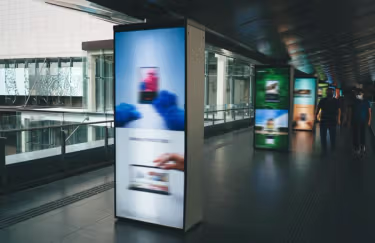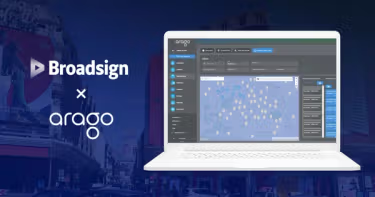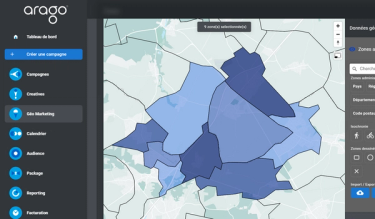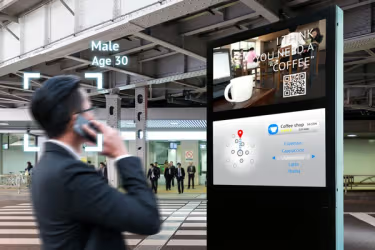
OUI PUB, AN OPPORTUNITY FOR RETAIL NETWORK COMMUNICATION
In France, the Climate Law has launched the "Oui Pub" experiment, allowing leaflets to be delivered only to the letterboxes of those who want them. This development is encouraging advertisers to find alternatives to traditional leaflet distribution. Paradoxically, this legal constraint represents a great opportunity for retailers, enabling them to accelerate the digitalization of their networks. Digital offers many advantages over paper: sustainability, efficiency, and transparency.
Oui Pub, a French experiment
For exactly a year now, France has been experimenting the Oui Pub program in the territories of 14 volunteer local authorities. The principle is simple. In the tested areas, the distribution of unaddressed printed matter is prohibited, except to those who have explicitly requested it through a "Oui Pub" sticker affixed to their letterbox. After an initial phase of information and distribution of the Oui Pub stickers, the experiment was launched in September 2022 for a period of 3 years. Steering and evaluation committees will regularly monitor the experiment and its economic and environmental impacts.
Ecology and CSR
According to the French Ministry of Ecology, 894,000 tonnes of unaddressed printed matter were distributed in the country in 2019. At the beginning of 2022, the Planetoscope website estimated the total marketing budget invested in France at 2.8 billion euros a year, 400 million of which was spent unnecessarily. With the ever-increasing cost of paper, these expenses would have continued to rise if nothing had been done to limit the distribution of unaddressed printed matter. Environmental issues are increasingly important to brands, and seen as such by consumers. For a retail network, announcing a reduction in paper printing is an excellent way of showing its ecological goodwill.
Efficiency and ROI
Abandoning paper communications to redirect their budget towards digital is also a pragmatic and profitable choice. Multi-channel and multi-local solutions like Arago are particularly well suited to the challenges facing retailers.
Reaching increasingly connected consumers
Firstly, because customer habits have changed. While they continue to visit physical stores in masses, they are increasingly turning to the Internet for information. 86% of Internet users do web searches on local businesses, their products and services.
Capitalizing on interactivity
The use of digital flyers is less expensive: more and more retailers are integrating them into their websites. These formats also have the advantage of integrating interactive functions, such as call-to-action or lead retrieval.
Refining targeting
The precision of targeting offered by digital campaigns, both geographically and socio-demographically, limits audience wastage. Sales outlets can communicate on their catchment area only, and in a selected way, based on travel time for example.
Personalizing the message
Digital campaigns can also integrate optimization functions (DCO), for example, by personalizing the message for each local area.
Leveraging the power of the media mix
The complementarity of different online formats, combined with offline campaigns, is a formidable asset. By applying a multi-channel strategy, a retail network enables its outlets to track prospects throughout the conversion tunnel.
Measuring performance
It's very difficult to calculate the ROI of a paper flyer campaign. Digital formats, on the other hand, enable precise reporting on reach, click-through and conversion rates. This information can also be used to implement A/B testing strategies to optimize campaigns in real time.
A win-win solution for network heads and their outlets
The Oui Pub experiment does not mark the end of paper communication, but rather a rebalancing to adapt retail network communication to today's uses. Democratizing digital communication for local retailers means offering them the same opportunities as national advertisers. And for network heads, it's also an opportunity to increase their revenues by taking a commission on the devices offered to local stores.

Programmatic Advertising: A Revolution for Trade Marketing
read
ARAGO the first programmatic platform connected to all DOOH inventories worldwide
read
What future for advertising in a cookieless world?
read
Why use a SaaS platform for all local communication needs?
read
ARAGO Teams Up with @Broadsign
read
ARAGO Teams Up with Broadsign to Bridge DOOH & Digital Ad Transactions
read
ARAGO Teams Up with Broadsign to Bridge DOOH and Digital Ad Transactions
read
Multi-local and multi-channel communication : a new key issue for organizations with multiple locations
read